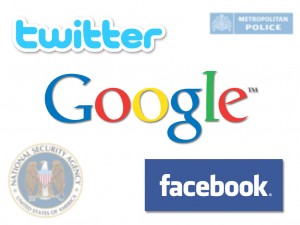
As more and more people happily share their personal information and live their life online, law enforcement agencies is having an easier job then ever. Internet companies such as Google, Twitter and Facebook most of the time try to keep their users information private, but their are also increasingly cooperating with law enforcement agencies giving them a great surveillance tool at the same time. The information they gather is proving irresistible to law enforcement agencies.
Google, Twitter and Facebook base their business models on gathering information about their users, and their behavior, then exploiting it to sell targeted advertising. When governments demand they hand it over, they have little choice but to comply. Recently it’s been suggested that RIM (Research In Motion) might have given user data to the British police after its messenger service was used to coordinate riots this summer. This caused quite a stir as the implications of this became clear. This information exchange could just as easy have been with a less democratic government. The communication that was conducted through the RIM messenger services is suppose to be secure and encrypted, and this proved to be a false security for some of the users of the services in this particular case
The vast amount of personal information that companies like Google collect to run their businesses has become simply too valuable for police and governments to ignore. “When the possibility exists for information to be obtained that wasn’t possible before, it’s entirely understandable that law enforcement is interested,” Google‘s Chief Internet Evangelist Vint Cerf told Reuters in an interview.
Conducting surveillance have never been so easy and never been this cheap to conduct. Google charges an administrative fee of $25 to hand over data, Yahoo charge $20, and Microsoft and Facebook provide data for free.
Some governments are requiring Internet companies to collect more data and keep it for longer, said Katarzyna Szymielewicz, executive director of Poland’s Panoptykon Foundation, which campaigns for human rights in light of modern surveillance.
“Government agencies throughout the world are pushing companies to collect even more data than is needed for their business purposes,” she told the conference.
“For example, we have a very controversial data retention regime which is currently under review. This requires people to store data for a period up to two years so it can easily be accessed by law enforcement agencies.”
One police officer, or government agent can from the comfort of their office, anywhere in the world, track 10, 20, maybe even 50 people at the same time for little or no cost. And all through simple Web interfaces provided by mobile companies. Even if the issues of personal privacy have been raised more often in the media recently, people continue to login to Facebook, use Twitter, and search on Google. The cost of surveilling one person now almost nothing and their is no sigh of this changing anytime soon.
